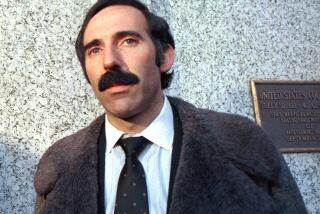Prosecution Could Bring Bilzerian Lawyers to Stand
NEW YORK — Singer Co. Chairman Paul A. Bilzerian took the witness stand Tuesday for the first time in his criminal securities fraud trial, but his testimony was interrupted by a legal dispute that could allow prosecutors to call the former corporate raider’s own lawyers as witnesses.
Bilzerian’s main defense is that he didn’t have criminal intent when he arranged with the Los Angeles brokerage firm Jefferies & Co. to secretly buy and hold blocks of stock for him in four companies that were takeover targets in 1985 and 1986.
But, over strong objections by the defense, U.S. District Judge Robert J. Ward ruled that if Bilzerian testifies he believed his actions were legal, prosecutors may cross-examine him on what steps he took to inform himself of the law, possibly including what advice he received from several sets of lawyers. An assistant U.S. attorney said this could open the way for the government to call the lawyers to the stand to say what advice they gave their client.
11 Counts Pending
Defense lawyers have claimed that any reference to the advice Bilzerian received from his attorneys would violate attorney-client privilege, which protects the confidentiality of clients’ consultations with their lawyers. But Judge Ward ruled that, depending on what Bilzerian actually says on the witness stand, he may, in effect, waive his right to keep such consultations secret.
Bilzerian, 38, was named last December in an indictment that accused him of securities and tax fraud, conspiracy and making false statements to the government. Eleven counts are pending against him. The indictment centers on charges that he failed to properly disclose his ownership of stock during raids on Cluett, Peabody & Co., H. H. Robertson Co. and Hammermill Paper Co. He is also accused of conspiring to conceal his ownership of a big block of Armco Inc. stock.
The issue raised Tuesday relates to charges that Bilzerian lied on the forms he was required to file with the Securities and Exchange Commission disclosing how much stock he owned in the companies. In testimony in a separate SEC proceeding, Bilzerian had stated that his lawyers had told him how to fill out the forms and that he didn’t believe he had done anything wrong.
Judge Ward issued his ruling after Bilzerian had testified for only about 90 minutes. Ward then granted defense lawyers’ request to recess the trial until today to allow the attorneys time to consider their options.
Defense lawyer Stephen H. Sachs said the lawyers would try to decide by today whether to sharply limit their questioning of Bilzerian to avoid opening the door to cross-examination on the legal advice he received by various attorneys, or to question him fully despite the risks.
Defense lawyer Arthur F. Mathews said one concern is that Bilzerian had a bitter legal dispute with the law firm Latham & Watkins over fees charged in advising Bilzerian in the Cluett, Peabody takeover attempt. Mathews said he feared that Latham & Watkins lawyers might be hostile to Bilzerian if called to testify.
Bilzerian’s brief testimony Tuesday was limited mainly to biographical material about his childhood, schooling and early work experiences. He testified that he failed French in ninth grade and later dropped out of high school. But he earned decorations as an army lieutenant in Vietnam, passed a high school equivalency exam, later graduated from Stanford University and received a master’s degree in business from Harvard.
More to Read
Sign up for Essential California
The most important California stories and recommendations in your inbox every morning.
You may occasionally receive promotional content from the Los Angeles Times.









